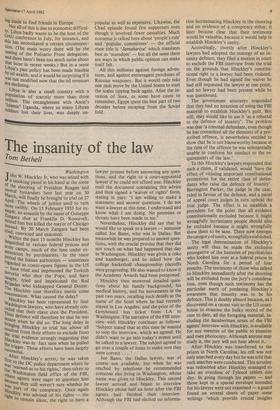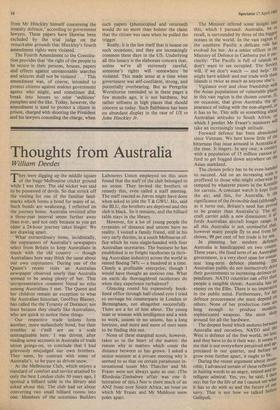The insanity of the law
Tom Bethell Tom Bethell
Washington John W. Hinckley Jr, who was seized with a smoking pistol in his hand at the scene of the shooting of President Reagan and March, bystanders here last year on 30 march, will finally be brought to trial on 27 April.- The wheels of justice used to turn More swiftly. On 15 February 1933 for ex-
Pie, an assassin by the name of Guiseppe 'angara shot at Franklin D. Roosevelt, missed him but killed the mayor of Chicago instead. By 20 March Zangara had been tried, convicted and executed.
, Within the past 13 months Hinckley has 'anguished in various federal prisons and min Camps, much of the time under ex- "'Lunation by psychiatrists. In the same Period the Italian authorities — sometimes regarded as comic-opera figures in the US have tried and imprisoned the Turkish terrorist who shot the Pope, and have caught, tried and imprisoned the Red brigades who kidnapped General Dozier. he Hinckley case therefore merits some examination. What caused the delay? ,Iiinckley has been represented by four 7ashington lawyers, who have already con- ed that their client shot the President. 1 heir defence will therefore be that he was binsane when he did so. The long delay in rringing Hinckley to trial has above all
the from their efforts to exclude from
Hinckley trial evidence strongly suggesting that nckley the • was in fact sane when he pulled 'Jigger. These efforts have been largely successful. After Hinckley's arrest, he was taken rvivrst to the DC police department where he theWherebecause they still weren't sure whether he Iii Part of the conspiracy. Once again ncideY Was advised of his rights — the right to remain silent, the right to have a
lawyer present before answering any ques- tions, and the right to a court-appointed lawyer if he could not afford one. Hinckley read the document containing this advice and then signed a 'waiver of rights' form, stating in part: 'I am willing to make a statement and answer questions. I do not want a lawyer at this time. I understand and know what I am doing. No promises or threats have been made to me.'
Nevertheless, Hinckley did say that he would like to speak to a lawyer — someone called Joe Bates, who was in Dallas. But meanwhile he was prepared to answer ques- tions, with the crucial proviso that they did not touch on what had happened that day in Washington. Hinckley was given a coke and hamburger, and he asked how the college basketball championship playoffs were progressing. He also wanted to know if the Academy Awards had been postponed.
Hinckley then answered detailed ques- tions about his family background, his medical history, and his movements in the past two years, recalling such details as the name of the hotel where he had recently stayed in Los Angeles, and the price of the Greyhound bus ticket from LA to Washington. The narrative of the FBI inter- view with Hinckley continues as follows: `Subject stated that at this time he wanted to stop the interview, which we agreed. He didn't want to go into today's events until he talked to a lawyer. The subject agreed to go over a couple of items to make sure they were correct .... '
Joe Bates, the Dallas lawyer, was of course not available, but when he was reached by telephone he recommended someone else living in Washington, whose name was given to Hinckley. This second lawyer arrived and began to interview Hinckley about half an hour after the FBI agents had finished their interview. Although the FBI had elicited no informa-
tion incriminating Hinckley in the shooting and no evidence of a conspiracy either, it later became clear that their testimony would be valuable, because it would help to establish Hinckley's sanity.
Accordingly, shortly after Hinckley's lawyers had adopted the strategy of an in- sanity defence, they filed a motion in court to exclude the FBI interview from the trial on the grounds that Hinckley's constitu- tional right to a lawyer had been violated. Even though he had signed the waiver he had still requested the lawyer at one point, and no lawyer had been present while he was questioned.
The government attorneys responded that they had no intention of using the FBI material to establish Hinckley's guilt. But still, they would like to use it 'as a rebuttal to the defence of insanity'. The problem was that 'a criminal defendant, even though he has committed all the elements of a pro- scribed offence, is nevertheless entitled to show that he is not blameworthy because at the time of the offence he was substantially unable to conform his conduct to the re- quirements of the taw.'
To this Hinckley's lawyers responded that such a claim, if validated, would 'have the effect of vitiating important constitutional protections for the entire class of defen- dants who raise the defence of insanity'. Barrington Parker, the judge in the case, ruled in favour of the defence, and a panel of appeal court judges in turn upheld the trial judge. The effect is to establish a precedent for the point that all evidence constitutionally excluded because it might wrongfully incriminate people should also be excluded because it might wrongfully show them to be sane. There now emerges the category of sanity, wrongfully established.
The legal determination of Hinckley's sanity will thus be made the exclusive prerogative of the batteries of psychiatrists who looked him over at a federal prison in North Carolina for a period of four months. The testimony of those who talked to Hinckley immediately after the shooting will be excluded from the jury's considera- tion, even though such testimony has the particular merit of predating Hinckley's awareness that insanity was to be his defence. This is doubly absurd because, as I discovered on a recent visit to the US court- house to examine the bulky record of the case to date, all the foregoing material, in- cluding the handwritten notes of the FBI agents' interview with Hinckley, is available for any member of the public to examine and even photocopy. Although anyone may study it, the jury will not hear about it.
After Hinckley was transferred to the prison in North Carolina, his cell was not only searched every day but he was told that such searches were conducted. This scrutiny was redoubled after Hinckley managed to take an overdose of Tylenol tablets one day. In going through his papers — and those kept in a special envelope intended for his lawyer were not examined — a guard found on several sheets of paper some writings 'which provide crucial insights from Mr Hinckley himself concerning the insanity defence,' according to government lawyers. These papers have likewise been excluded by the trial judge on the remarkable grounds that Hinckley's fourth amendment rights were violated.
The Fourth Amendment to the Constitu- tion provides that 'the right of the people to be secure in their persons, houses, papers and effects against unreasonable searches and seizures shall not be violated ...' This amendment was, of course, intended to protect citizens against zealous government agents who might, and sometimes did, break into houses to seize 'seditious' pamplets and the like. Today, however, the amendment is used to protect a citizen in prison, charged with shooting the President and his lawyers conceding the charge, when such papers (photocopied and returned) would do no more than bolster the claim that the citizen was sane when he pulled the trigger.
Really, it is the law itself that is insane on such occasions, and they are increasingly common these days in the US. Underlying all this lunacy is the elaborate concern that, unless we're all extremely careful, someone's rights will somewhere be violated. This made sense at a time when government was self-confident, strong, and potentially overbearing. But as Peregrine Worsthorne reminded us in these pages a few months ago, it is not hardness, but rather softness in high places that should concern us today. Such flabbiness has been on abundant display in the case of US vs John Hinckley Jr.



































 Previous page
Previous page